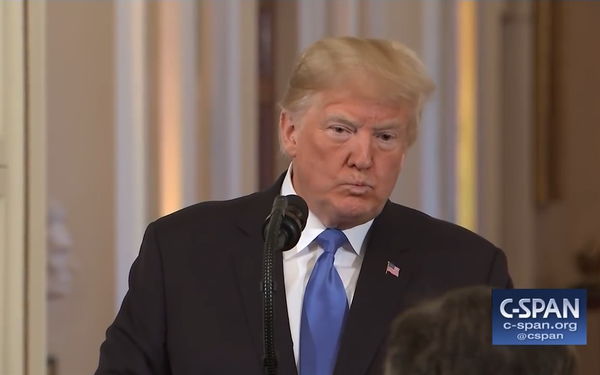White House Defends Decision To Revoke Acosta's Press Pass
- by Wendy Davis @wendyndavis, November 14, 2018

The White House and President Trump have “absolute discretion” to decide which journalists receive press credentials, the administration argued in court papers filed Wednesday.
“No journalist has a First Amendment right to enter the White House and the President need not survive First Amendment scrutiny whenever he exercises his discretion to deny an individual journalist one of the many hundreds of passes granting on-demand access to the White House complex,” the government wrote in its legal papers.
The government alternatively argues that its decision was justified because Acosta was “disruptive” at a press conference on November 7.
“Revoking a reporter’s hard pass for impeding the White House’s ability to conduct fair and orderly press conferences is not 'arbitrary,'” the White House argues. “Rather, it preserves the White House’s ability to balance each individual reporter’s desire to ask questions with the need to abide by norms that permit other reporters to ask questions as well.”
The administration's argument comes in response to a lawsuit filed Tuesday by CNN and reporter Jim Acosta over the government's decision to revoke Acosta's press pass. CNN and Acosta argue that the move was unconstitutional on the grounds that it stemmed from Trump's dislike of the substance of their reporting.
CNN and Acosta have asked U.S. District Court Judge Timothy Kelly in the District of Columbia to issue a temporary restraining order requiring the administration to restore Acosta's “hard pass,” which allowed him to enter the White House and press offices.
Kelly held a hearing on the request on Wednesday. He said he will issue a ruling on Thursday afternoon.
At the hearing, a lawyer for CNN reportedly noted that the Trump campaign on Wednesday sent an email boasting about the decision to revoke Acosta's press pass. That email blasted CNN's “liberal bias.”
More than a dozen media companies -- including The Washington Post, The Associated Press, The New York Times, Politico and Fox News -- rallied to CNN's defense.
"Fox News supports CNN in its legal effort to regain its White House reporter’s press credential," Fox News President Jay Wallace said in a statement. "Secret Service passes for working White House journalists should never be weaponized."
Other news organizations' support for Acosta could undercut the White House's claim that his actions at the press conference hindered other journalists' ability to ask questions, according to David Ardia, co-director of the Center for Media Law and Policy at the University of North Carolina.
Ardia also notes the White House changed its story about why it removed the press pass.
"The shifting rationale as to why that pass was revoked makes it harder for them," he says.
Shortly after the November 7 press conference, press secretary Sarah Sanders posted a video that, in her words, appeared to show Acosta "placing his hands" on the staffer who had tried to take away the microphone.
But that clip had been doctored to make Acosta's actions seem violent when they were not: The un-doctored clip -- accessible on C-SPAN -- shows Acosta trying to hold onto the microphone as the staffer tried to physically grab it away.
The administration's current explanation -- that Acosta's attempt to ask follow-up questions was disruptive -- wasn't articulated until after it emerged that the clip initially posted by Sanders had been distorted.


